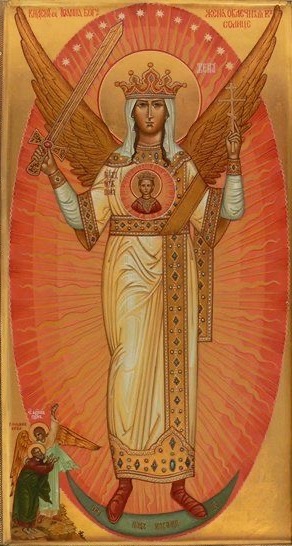“One does not become enlightened by imagining figures of light, but by making the darkness conscious. The latter procedure, however, is disagreeable and therefore not popular.” – C.G. Jung
In the Judeo-Christian religious history, the divine has often been portrayed through masculine imagery—God as Father, King, or Warrior.
Yet, a long-neglected and abandoned aspect of the divine is the feminine side of God, personified in many traditions as Sophia, the Gnostic Goddess of Wisdom.
Who is Sophia?
Sophia, whose name means “wisdom” in Greek, is the personification of divine wisdom, an emanation of the eternal Godhead, and a bridge between the ineffable Source and creation. In Gnostic texts, Sophia is portrayed as a luminous being who descends from the divine realm, driven by her yearning to create and know the fullness of God.
Yet she fell from grace.
According to Gnostic mythology, Sophia’s descent into the material world was an act of independence that led to her separation from the divine pleroma (the fullness of God).
Sophia became entangled in the chaos of matter and ignorance in her fall, giving rise to the flawed material world and the demiurge, a lower creator deity.
The Gnostic Gospels
The Church labeled Gnostic teachings heretical during the 2nd and 3rd centuries. This culminated in the destruction of Gnostic texts and the suppression of this spiritual worldview.
By happenstance, the Nag Hammadi library was stumbled upon by a local farmer near the Egyptian town of Nag Hammadi in 1945, revealing many of these lost writings. These lost gospels showed how central Sophia was to Gnostic spirituality. It is believed that, knowing these texts would be destroyed, they were hidden for protection.
In 1979, Elaine Pagels, a Princeton University professor, wrote, “The Gnostic Gospels”. It was an unlikely sensation. A young historian without tenure and a specialist who read 1st-century languages like Coptic, she was one of the first to illuminate an ancient trove of long-lost gospels and other writings about Jesus.
She writes about the Secret Gospel of John where God is arrogant and boastful, saying “I am father, and God, and there is no one above me!” But then his mother’s voice, divine Wisdom, comes down from above, stating, “You are mistaken!”
This is SOPHIA.
Sophia as the Divine Feminine
Sophia embodies the divine feminine qualities of wisdom, intuition, compassion, and creativity. She represents the nurturing aspect of God, the sacred womb from which all life emerges, and the wisdom that guides us back to our divine origins. Her exile from the pleroma mirrors the suppression of feminine energy in our world—a suppression that has led to imbalance, disconnection, and a lack of harmony.
The return of Sophia signifies a collective awakening to the feminine side of God. It calls us to honor the wisdom of our hearts, embrace the cycles of nature, and cultivate a deeper relationship with the mysteries of life. By integrating Sophia’s energy, we open ourselves to a more holistic and balanced understanding of the divine.
The Age of Aquarius and the Return of Sophia
The Age of Aquarius, often associated with transformation, innovation, and the rise of collective consciousness aligns with Sophia’s energy in profound ways. This astrological age, characterized by air sign qualities of intellect and interconnectedness, encourages humanity to transcend old paradigms and embrace new ways of being. The Aquarian ideals of equality, collaboration, and spiritual evolution resonate deeply with Sophia’s call for integrating wisdom and compassion.
Sophia’s return is not just a spiritual concept, it is a movement toward restoring balance in our world. The Age of Aquarius invites us to dismantle patriarchal systems prioritizing dominance over cooperation and logic over intuition. It encourages the merging of masculine and feminine energies within ourselves and society, allowing for a harmonious coexistence reflecting the divine unity of the cosmos.
Embracing Sophia in Daily Life
In this time when our religious tradition cannot adequately contain our spiritual longings, we can bring this energy into our lives by:
- Cultivating Inner Wisdom: Spending time in meditation, reflection, and self-inquiry to connect with your inner wisdom and intuition.
- Honoring the Feminine: Recognize and celebrate the feminine qualities within yourself and others, such as empathy, creativity, and nurturing.
- Seeking Balance: Strive for harmony between the masculine and feminine energies in your life, integrating logic with intuition and action with receptivity.
- Reconnecting with Nature: Sophia is deeply connected to the natural world. Spend time in nature to attune to her wisdom and the rhythms of life.
- Engaging in Spiritual Practices: Explore practices that resonate with the divine feminine, such as working with the moon cycles, studying Gnostic texts, or creating rituals that honour Sophia.
A New Era of Wisdom
The return of Sophia and the Age of Aquarius marks a pivotal moment in humanity’s spiritual evolution.
As we embrace the feminine side of God, we unlock a wellspring of wisdom and compassion that can guide us toward a more balanced and enlightened existence. Sophia’s story reminds us that even in moments of separation and struggle, the potential for redemption and unity is always within reach.
By honoring Sophia, we reclaim a forgotten aspect of the divine and participate in the healing and transformation of our world. Together, we can co-create a future where the sacred feminine and masculine dance harmoniously, ushering in an era of wisdom, love, and collective awakening.
Have you found value here? Have you been inspired or moved? Please consider sharing the post on your social media networks by using the buttons below.
I love to hear your comments and ideas. Use the comments below or send me an email.
Is this your first time here? Does your soul need feeding? Are you looking for a Jungian based inspirational reflection to help with life's challenges. The Jungian Path Newsletter is a monthly reflection on the theme of the new moon. Join the list today.

